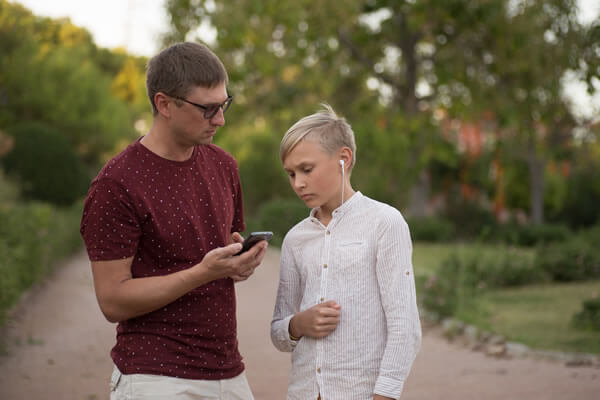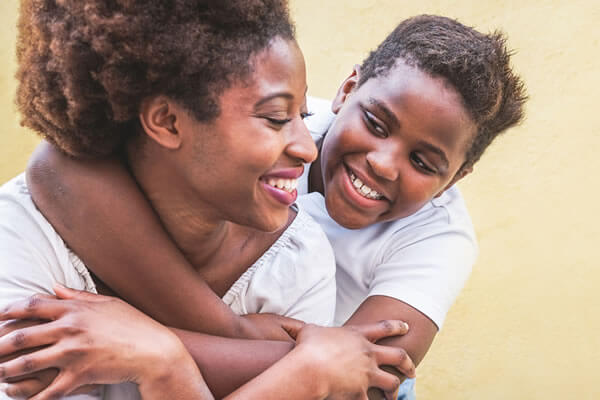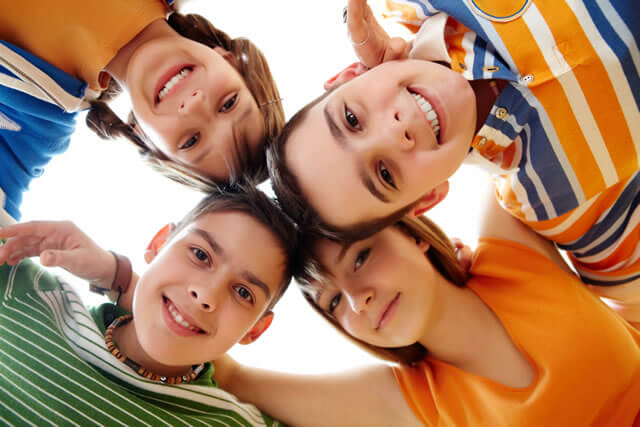 Meet Me in the Middle:
Meet Me in the Middle:
What You Need to Know to Really Know your Middle Schooler
Where Did My Child Go?

Parenting a middle schooler can often feel like swimming upstream. Treading through oceans of eye rolling. In our new Meet Me in the Middle series of blogs, we’ll address various topics to help you understand where your child is at this moment, how to meet them exactly where they are, and how to help both of you traverse the early adolescent years, which are a perfect storm of social, biological and educational changes.
In our first blog Where Did My Child Go?, we speak with Dr. Michael Oberschneider, an LCDS parent, highly accredited clinical psychologist and the founder of Ashburn Psychological and Psychiatric Services. Dr. Oberschneider currently provides ongoing access to emotional and psychological support for our students, faculty, and staff on an as-needed basis.
Here, he explains what’s going on developmentally and how your role can adjust to meet your child’s new needs.
What is the biggest shift happening in a middle schooler’s thought process?

Where younger children will see a situation or person or problem as being only all “good” or “bad” or “right” or “wrong,” tweens are able to begin to see the complexities. For example, a younger child will view Darth Vader from Star Wars as simply the bad guy, where middle school children are able to play with that idea a little more. If asked, middle schoolers will tell you that Darth Vader is bad, but they can also appreciate his struggles and motivations – the impact of the separation from his mom and later tragic loss of her, his being manipulated by the Emperor, his secret love interest in Padme – in understanding why he behaved the way he did.

Yes, definitely. But there are also differences between an 11-, 12- and 13-year old. Erik Erickson, the developmental and social psychologist, categorized development into 8 stages. For Erikson, by 11, children are more self-aware, and they are tasked with how they fit in and how they’re competent and self-confident. The school and social environments are the two main areas where this plays out. Parents and teachers should be especially supportive, available and encouraging at this stage to promote and instill confidence and competency. When a child at this stage struggles and doesn’t receive the support he or she needs, problems of shame, “badness” and inferiority can occur. When a child is 12- or 13-years old, he or she can explore their independence more with the goal of developing a greater sense of self in the world. Whereas the 11-year old is more focused on “How can I be good?,” the 12- and 13-year old has moved on to the idea of “Who am I?”

Parents and teachers want to support and encourage children to try out new things and roles and ideas. This is also a developmental phase, however, where children will exercise poor judgment and poor impulse control because there’s a lot of testing. This is when it becomes more important to be structured and firm as a parent—empathetic, for sure, but also setting clear boundaries.
Also, recognize that the brain changes that are occurring make kids seek social rewards more than they have in the past. By that, I mean that they can be in this feedback loop with their peers, where they want to be accepted and admired, so they will do whatever gives them that payoff. There are two sides to that, of course, but the need for peer approval is very strong at this age and that can be hard for parents to understand sometimes.
What are some other types of behavioral changes that parents expect?



I call these the push-pull years in that our children will begin to want to push us away to try out how they want to do things more independently, but they will still want and need us to help them at times. It’s not uncommon for parents or teachers to view some of what is happening at this phase of development negatively.
Certainly, tweens can be oppositional or disrespectful, but a lot of what they’re saying and doing is also new to them; they’re trying out how to fit in, how to be confident and how to be unique between 11 and 13 and that’s a lot to take in and try to always get right. When tweens misbehave, I recommend that teachers and parents find a balance of being loving and firm in terms of correcting what needs to be corrected.
Remember that, biologically, their emotions are unpredictable. Instead of thinking of it as a child trying to be difficult, think of it as a child on a rollercoaster. Just don’t get on the ride with them. Wait until the ride is over to say what you want to say (whether it’s about boundaries or listening to what put them on the rollercoaster), because while they’re on it, they won’t hear a word you say. They’ll escalate, you’ll escalate, and it won’t lead anywhere positive. As the parent, make it your job to stay on the ground and wait for them to land alongside you.
Modeling is also key at this phase of development, since our children learn a lot about how they want to behave or be in the world from watching their parents and teachers. For example, instead of telling your child what to do when there’s a friendship rift (one of the most common dramas at this age), give them an example of how you handle the same type of thing in your life: “You know, I work with a guy who is not someone who I’d probably invite over on a Saturday night—we’re pretty different. But we do get a quick lunch together sometimes, and last time, I was surprised that we actually liked the same movies/author/football team. We don’t have to be best friends to have moments like that together once in a while.”
Open-ended questions go a long way too, “How would you want someone to treat you?” They’re able to process more complicated situations now, but may need help thinking through the steps to get to the other side.
What I tell parents all the time is just to be there. It sounds too simple to be effective, but it really is the best advice I can give. At times, your child will need an open, trusted ear to vent their upset feelings. At other times, they will need guidance. At other times, they will just need a shoulder to cry on or a hug. At other times they will just want someone to watch their favorite TV show with or to do an activity with. Northern Virginia is a busy place, and COVID-19 has created even more challenges for many of us as adults, but putting aside time every day for your child will pay back 10 fold for them in terms of their happiness and success in life. Family meals, family activities, family traditions, family vacation or staycations, family chores, family errands are all important moments, even if it sometimes seems like they don’t want to be there.






Next up in Meet Me in the Middle, we’ll talk about the trickiness of Navigating Friendship Drama, one of the biggest challenges of the middle school years.

Michael Oberschneider, Psy.D. “Dr. Mike” is a clinical psychologist in private practice.
He can be reached at 703-723-2999, and is located at 44095 Pipeline Plaza, Suite 240, Ashburn.
